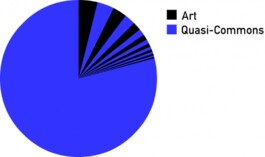Art and the Quasi-Commons
Event at the Institute for Contemporary Arts (ICA), London, 2017.
Organised by Corporated Culture for Creative Innovation (CCCI) (Ian Gouldstone, Marcel Darienzo, Anne de Boer, Maeve O'Neill, Robbie Howells, Laura Yuile).
Using In formation as a platform, the Corporated Culture for Creative Innovation (CCCI) group responds to the question of how practices of 'commoning' can be relevant for the contemporary moment. Relating to the work of Massimo de Angelis, among others, the group leads a seminar investigating the relationships between contemporary artistic practice, corporate culture and the commons. In today’s neoliberal conditions, how might artists operate more sustainably? What can art and artists do to intervene in the power structures of the art world and where does the artist fit within changing notions of 'public' and 'private'?
The CCCI focus the discussion around the online platform as quasi-commons, thinking through the pros and cons of engaging with existing platforms—Instagram, Facebook and the like—as tools for development as well as how they may be interrupted, re-purposed or used to inform the construction of new, collectively-owned and governed platforms. The speakers invited by the CCCI, Emily Rosamond and Frederique Pisuisse, consider these issues via an exploration of alternative modes of ownership and collectivity in regards to knowledge and resources.
Playing on Trebor Scholz’s 'platform cooperativism', Emily Rosamond’s lecture proposes a theory of 'platform indeterminism' – a way of thinking through sites of illegibility in online platforms as quasi-commons, suspended between surveillance-capitalist accumulation and collective action.
Frederique Pisuisse speaks about reclaiming a space for artistic production within a privatized online world. She unpicks practices of subtle and fraudulent protest of global platforms and institutions, while accepting all terms and conditions*
*parts of her practice could be considered illegal, play along at your own risk
